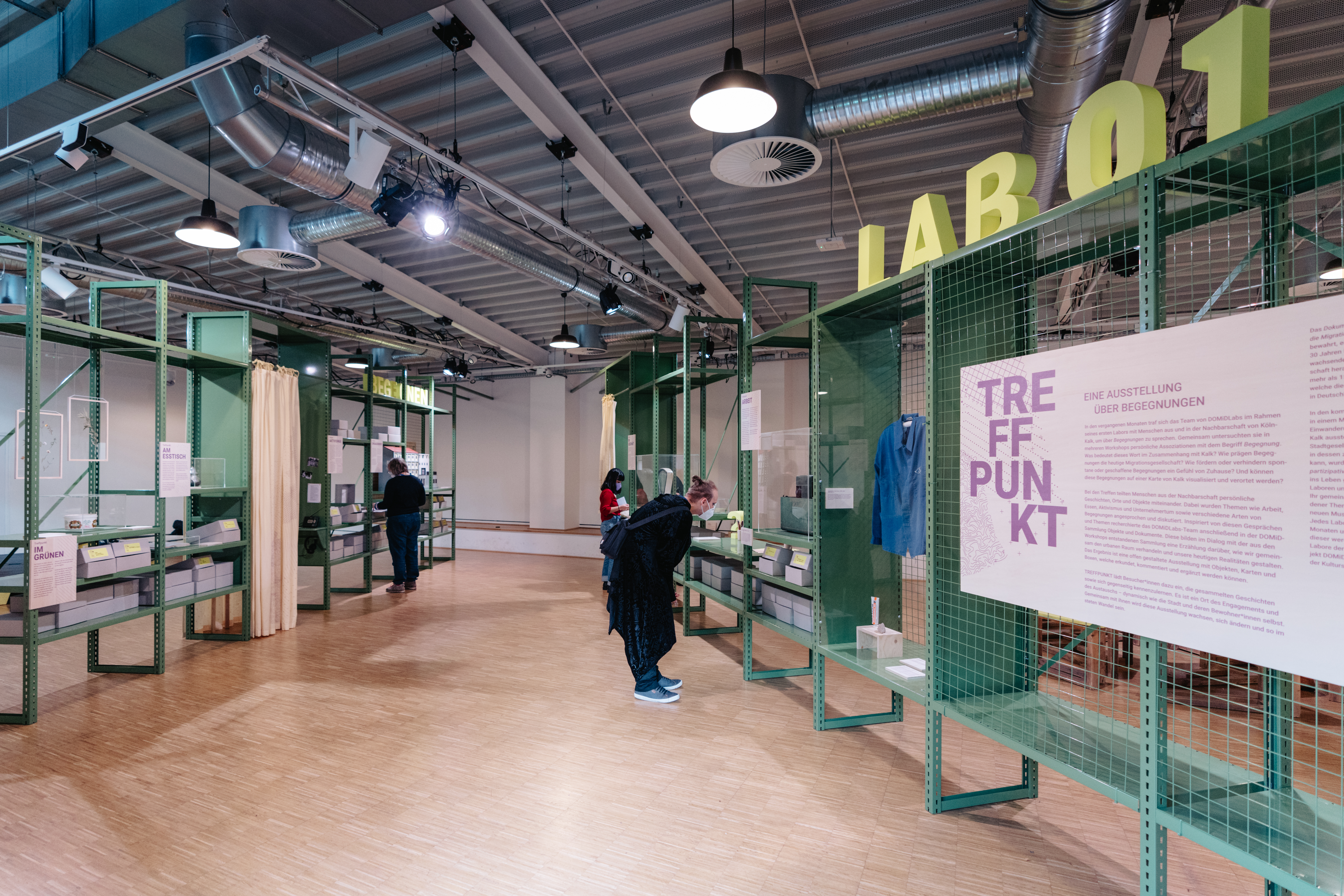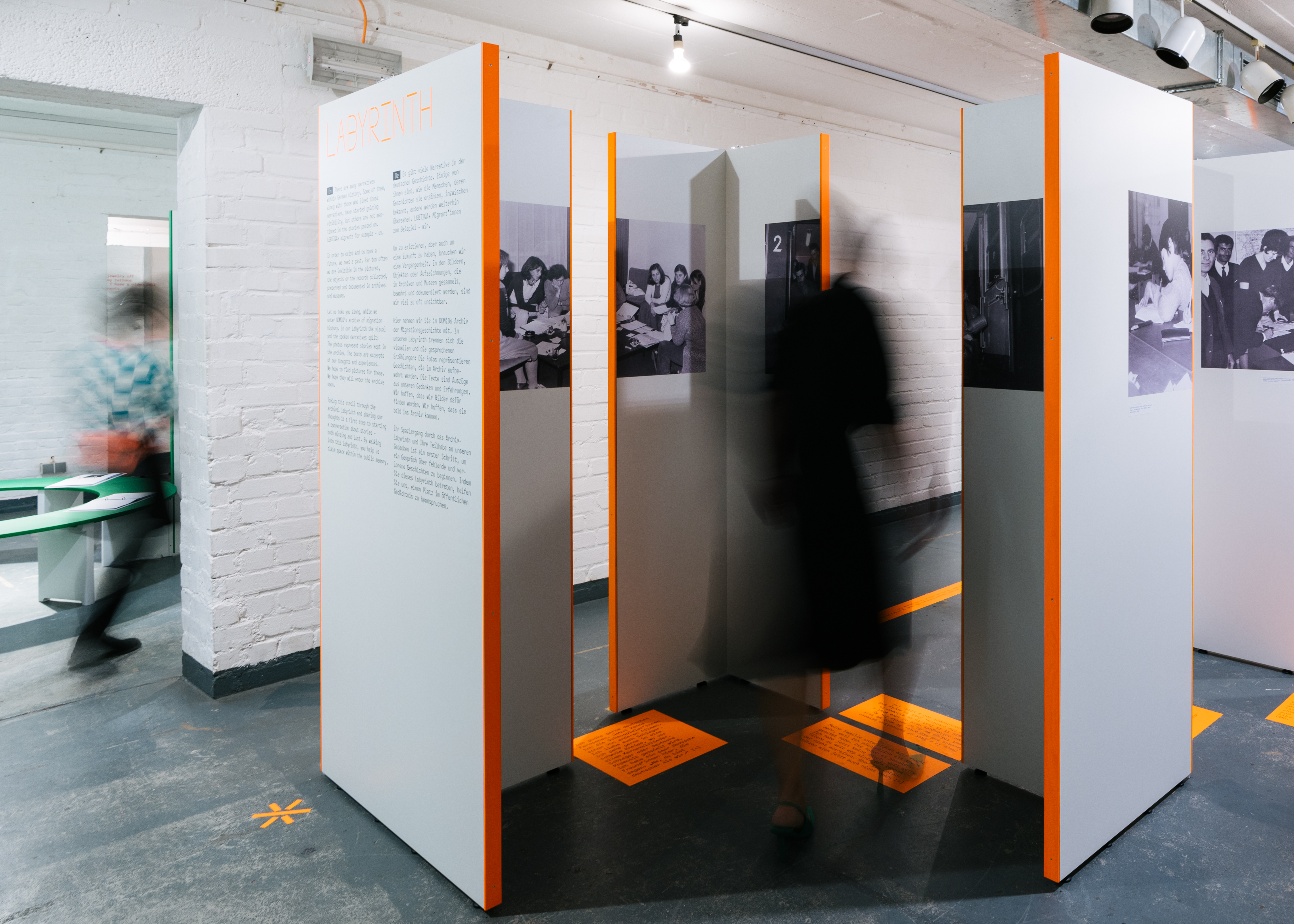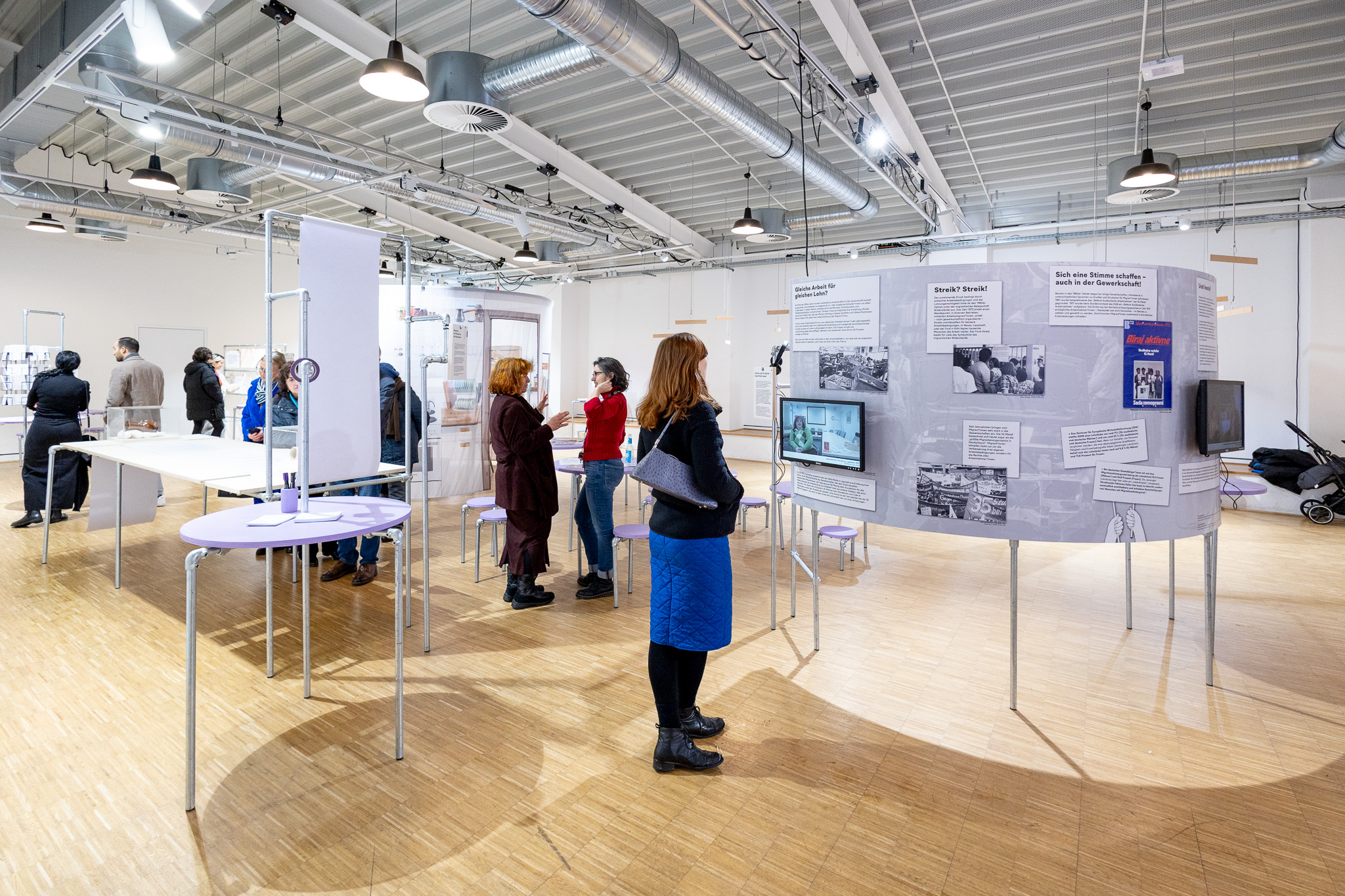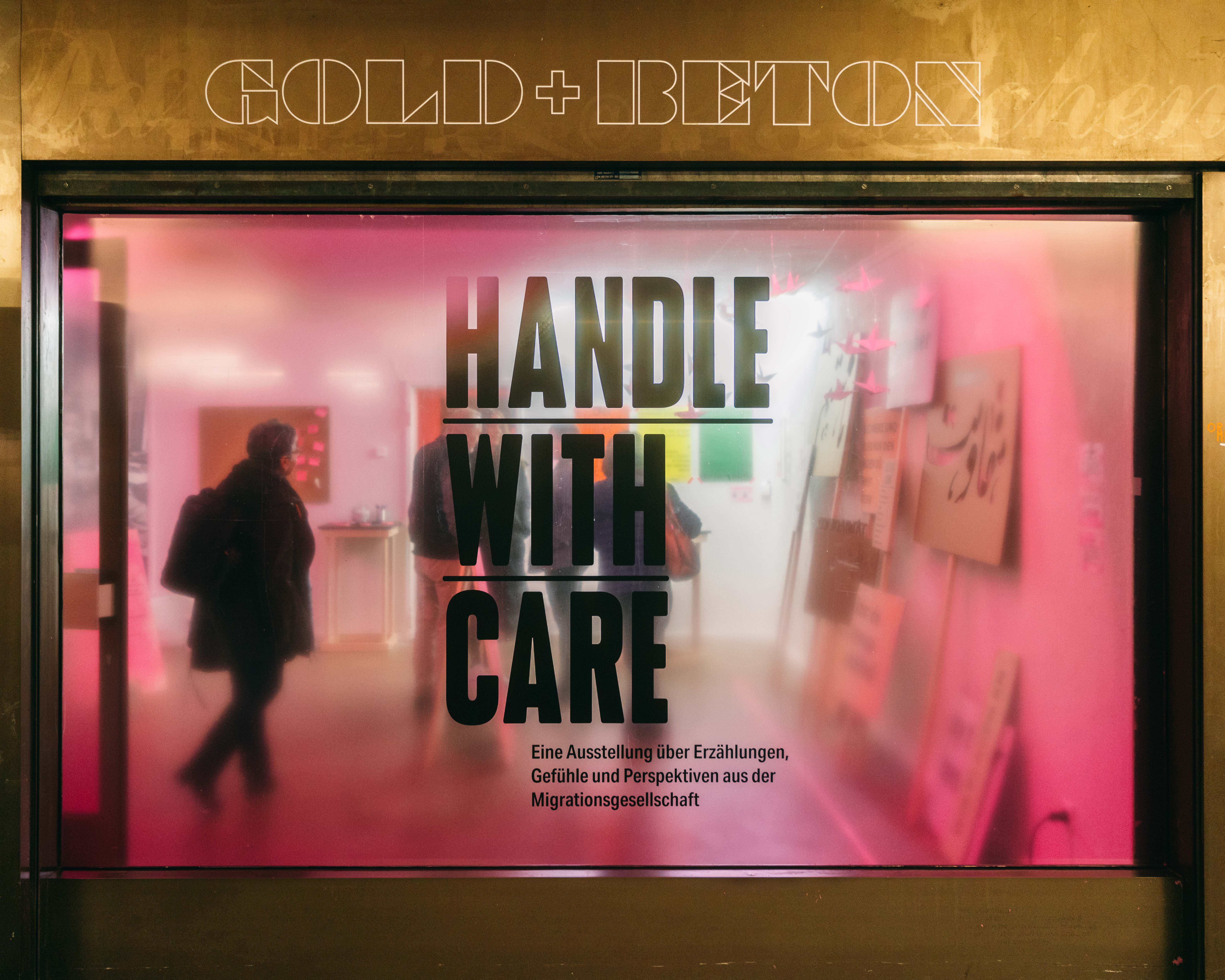
Our Projects
In addition to the day-to-day operations of the documentation centre, DOMiD also carries out various projects. They served and serve to develop: educational offers, to expand the DOMiD-collection, to collect stories on migration, and to generally reflect on the migration society.
We are currently in the construction phase of the Museum Selma, which is currently being realized as DOMiD's largest project. The participatory project DOMiDLabs took place as part of the preparations. Here you can find a selection of current and past projects.
The nation migration museum: Museum Selma
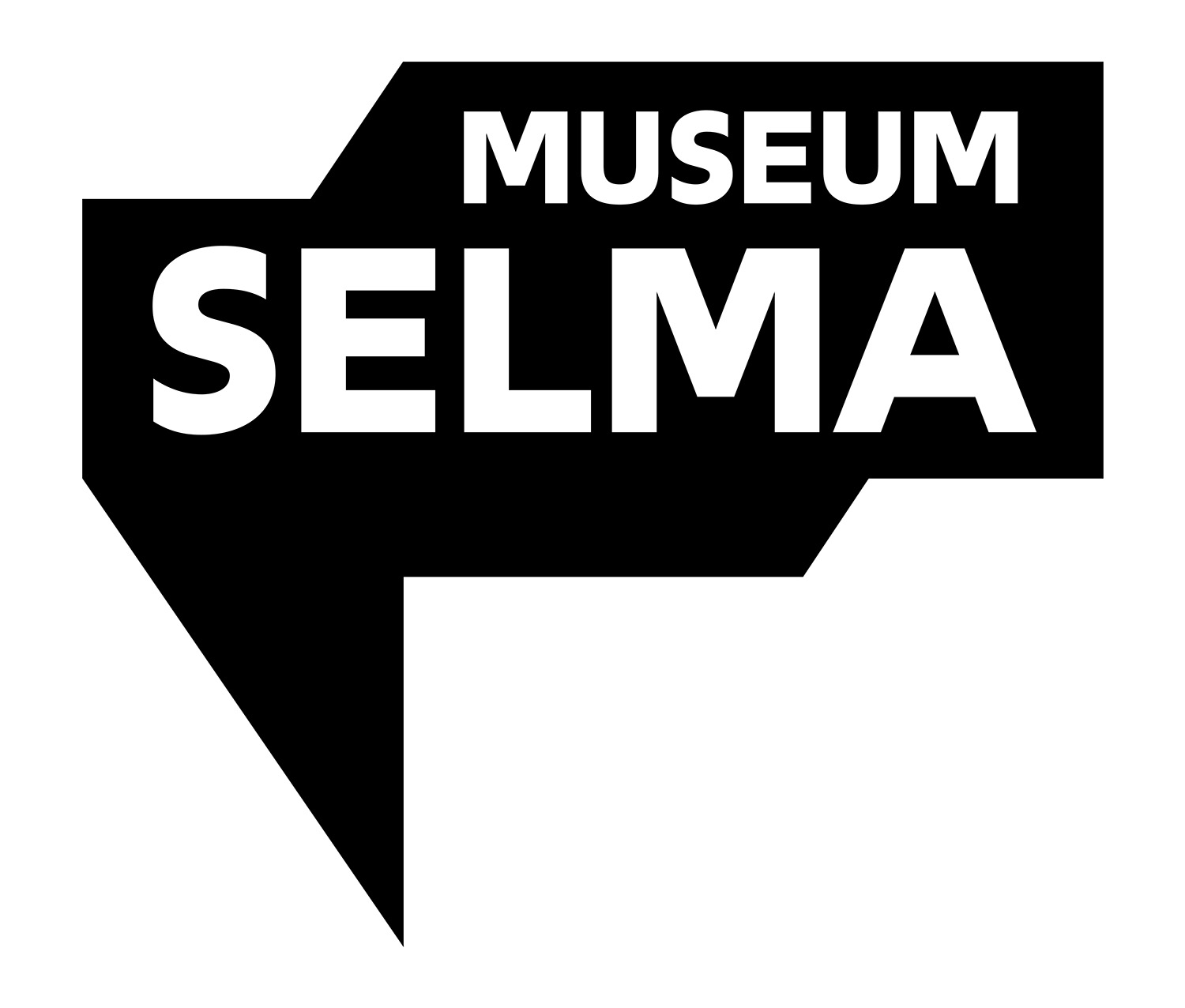
With the Museum Selma, a place is being created in Cologne where permanent and temporary exhibitions will show how migration has inscribed itself in German history and shaped our social coexistence. In addition, as a cultural and educational center, the house offers space for exchange and a change of perspective, for example on questions of identity, living together and participation.
Since its foundation, DOMiD followed the aim to build a museum in which migration is presented as a common phenomenon. This goal is now about to come to reality. In 2019, the federal government and the state of NRW included funds for the Museum Selma in their budgets. It is expected that it will open not before 2029.
DOMiDLabs: Making Museum Design Participatory
The project DOMiDLabs: Making Museum Design Participatory was initiated together with the German Federal Cultural Foundation to test how people from the wider community can participate in the Museum Selma and contribute to its future design. Under the slogan #unserMuseum gemeinsam gestalten, DOMiDLabs brought together different people in four labs - curators, scenographers, people people from the wider community and the project team. Their common goal was to develop and test ideas for the design of the new museum based on various topics. Questions of the Labs were, for example: How can people meet and interact with each other in the museum? What would an exhibition look like that would enable the museum to react to current debates? How can topics and stories be respectfully exhibited?
Each of the four labs took place in Cologne, run for about eleven months and closed with an exhibition. The ideas and findings resulting from labs were presented to the public in these exhibitions, and visitors were test and commented on them. The exhibitions were displayed in various locations in Cologne between 2022 and 2024.
DOMiDLabs is sponsored by the German Federal Cultural Foundation from 2021 through 2024.
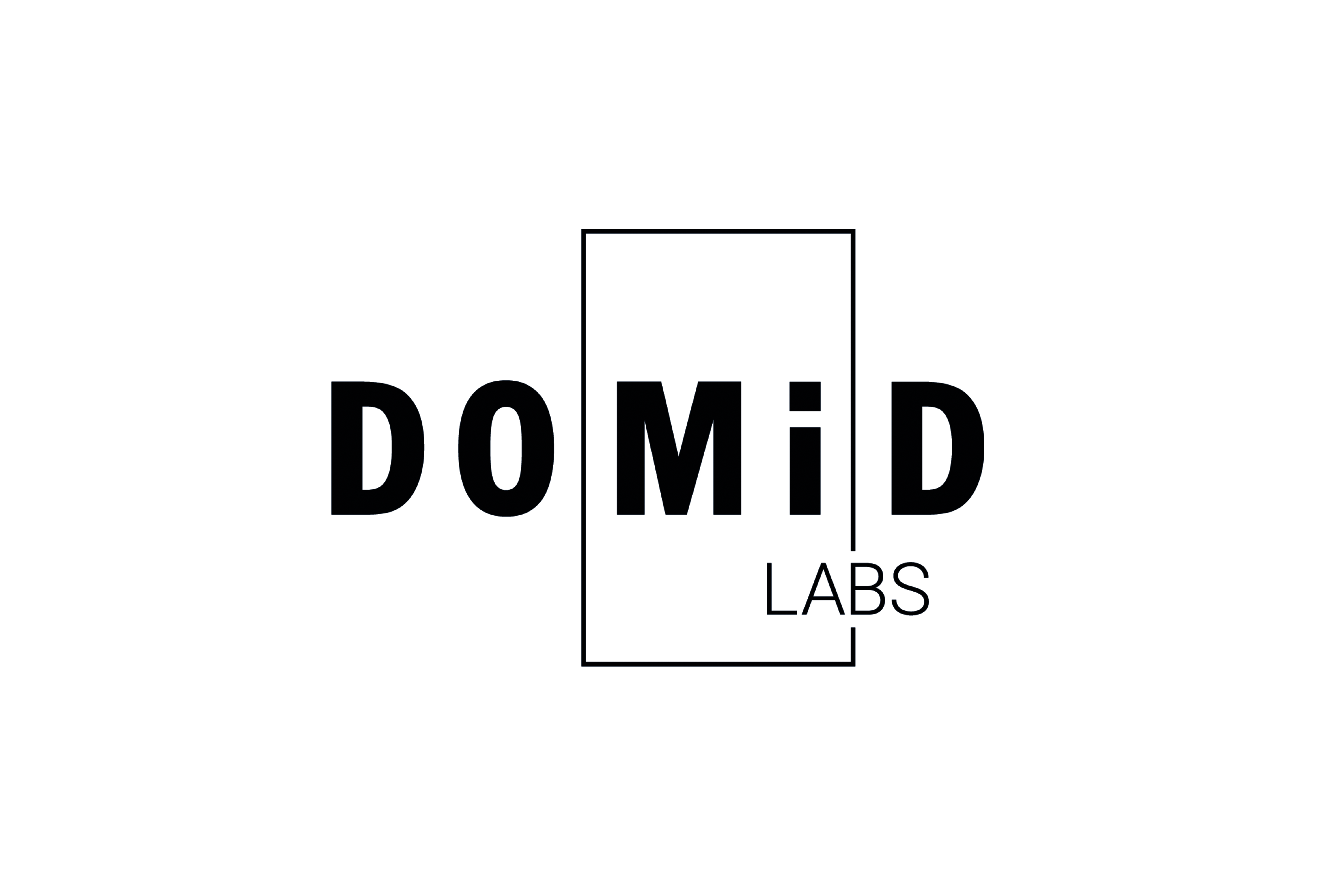
The Laboratories
#1 Meeting point museum - The "House of the Immigration Society" as a place of encounter
In the Meet Up! lab, we – together with people from Cologne Kalk – are tackling the topic "Encounter(s) in the Immigration Society", and asking the question of what an exhibition needs to invite visitors to engage in new encounters.
The lab takes place across multiple workshops. These are organized and led by Danielle Kuijten (Heritage Concepting, Amsterdam) together with DOMiD staff members Sandra Vacca and Azziza B. Malanda. The workshops are additionally supported and guided by the architecture collective raumlaborberlin. In coordination with the team, raumlaborberlin is taking on the design and construction of the exhibition. More information about the exhibition here and at domidlabs.de.
The result of the collaborative work is an open exhibition of objects, maps, and boxes that can be explored, commented, and added to. Visitors are invited to meet each other, to encounter narratives, places and objects from Kalk - and elsewhere - as well as to contribute their own. In this way, a dynamic place is created in which somewhat different exhibition experiences can be experienced together. More information about the exhibition here and at domidlabs.de.
#2 Mind the Gap! – Exhibiting What’s Missing
In every collection, and in every museum, there are missing objects as well as missing narratives – smaller or bigger gaps. The DOMiD collection also has such gaps. One of these gaps has been identified as LGBTIQA+ perspectives, raising the following questions: How can DOMiD's planned migration museum deal with gaps (in terms of design) in its permanent exhibition? In which ways can the LGBTIQA+ stories from within the migration society be told? Why are there (so far) only few objects and testimonies to this history? How do we deal with this gap in the DOMiD collection?
To address these questions, Lab #02 will bring together people with migration histories and experiences in LGBTIQA+ contexts as well as the DOMiD project team, a person to develop and implement the lab concept, and exhibition builders. The goal of this joint lab work is to create more attention and visibility for the aforementioned topic and its diverse life realities while also trying to break down problematic definitions and projections.
At regular meetings, the team exchanged personal and social LGBTIQA+ narratives and topics. The team then developed and tested design elements that translate the notion of "gap" visually and spacially.
In the exhibition Mind The Gap! Narratives and Questions from LGBTIQA+ Migrants, the results of Lab #02 will be presented from 31.03. – 04.05.2023 at the Kulturbunker Köln-Mülheim. Mind The Gap! demonstrates how gaps can be dealt with in terms of content and design. Learn more about the exhibition
More information about the exhibition here and at domidlabs.de.
***
The Lab team has agreed on using the term LGBTIQA+ as an abbreviation for lesbian, gay, bisexual, transgender, intersex, queer, asexual and + for further diverse sexual orientations and gender identities. The German translation of the term is LSBTIQA+, standing for: Lesben, Schwule, Bisexuelle, trans* Personen, inter Personen, queere Personen, asexuelle Personen and + for further sexual and gender identities.
#3 Re-Act! – The Design of (Re-)Active Elements
The kick-off meeting of Lab #03 took place in June 2023. It was attended by numerous people from urban society who had responded to a public call from DOMiDLabs. Together with İdil Efe (Berlin), Kollektiv Plus X (Leipzig), Sandra Vacca and Azziza B. Malanda (both DOMiDLabs), formed the lab team.
In terms of content, the third lab focussed on the following questions: How did and do people arrive in our society? How are they perceived, treated and seen here? What role do gender, racist attributions, social background and financial circumstances play in this? Or to put it another way: What is a person worth?
In addition to this, we jointly considered how a (re-)active permanent exhibition could be designed to take up current debates and the latest findings and to offer the public opportunities to add to and comment on them.
Lab#03 was organised in various workshops in which the participants contributed personal stories, thoughts and perspectives. These were gradually translated into design elements over the course of the lab process.
The results of the joint work will be on display in the Alte Feuerwache Köln hall from 20 January to 28 February 2024.
Information about the lab can be found here and at domidlabs.de.
#4 Trigger Warning! – Sensitive Objects and Topics in a Multi-Perspective Exhibition
In its exhibitions and programs, DOMiD deals with topics such as racism, war, flight and persecution. The objects on display and the stories told require both a critical and sensitive approach. Over the years, the DOMiD team members have experienced a wide range of reactions themselves and in discussions with exhibition visitors and workshop participants. Sadness, nostalgia, anger, shame, but also pride, melancholy, excitement and joy: sometimes it was objects, sometimes situations, sometimes topics, sometimes stories that suddenly triggered intense emotions - both positive and negative.
With focus on our nationwide migration museum being created in Cologne-Kalk, Lab #04 "Caution Trigger" poses the following questions: How can objects and stories that trigger strong feelings be sensitively displayed in an exhibition? Where do we encounter these feelings, with which senses do we experience them? How can we capture feelings, react to them, give them space? How can we as a museum find a creative and spacious way of dealing with them?
As the DOMiDLabs team, we dream of a space that, in the best case scenario, shows us what we long for in a society: A little more compassion.
Deniz Weber is the curator of Lab #04 and Studio Quack is responsible for the design and construction of the final exhibition.
The result of the collective, participatory work is Handle with Care – Eine Ausstellung über Erzählungen, Gefühle und Perspektiven aus der Migrationsgesellschaft. The exhibition can be seen from 12.10. - 28.11.2024 at GOLD+BETON and Gemeinde Köln in the Ebertplatzpassage, Cologne.
You find further information about the lab, the exhibition and the program here and at domidlabs.de.
Exhibitions of the four DOMiDLabs
Retrospective: A Selection of our Projects
#1 Meinwanderungsland – Every story counts | 2017-2020
According to the motto "Every story counts" the large-scale mediation project #Meinwanderungsland "Together on the way? History(s) of the Migration Society" was realized between December 2017 and September 2020.
In the first phase of the project, the focus was on a tour through the whole of Germany. With an interactive exhibition and storytelling platform, the #Meinwanderungsland team toured all 16 German states for 92 days in 2018/19. x On public places the team gave insights into the DOMiD collection and exchanged with passers-by about the topic migration. Additionally a platform for dialogue, workshops, city tours, readings and other events was offered.
Parallel two Workshops, for pupils*innen "with objects learn - racism understand" and "migration as normal case - Multiperspektivisch and transkulturell report" for medium-creative, were developed and successfully accomplished.
In the second project phase, the project adapted to the conditions of the Corona pandemic. Despite Covid-19, innovative alternative event and mediation formats were developed and the digital activities of the project were further expanded. The stories, videos and photos about migration collected both on the 2020 nationwide city tour and through our digital channels were shared on our blog and in social networks under the hashtag #Meinwanderungsland.
The project also helped DOMiD to further expand its nationwide networks.
The project was funded by the Federal Government Commissioner for Migration and Refugees and Integration.
The project "Meinwanderungsland" was awarded with the future prize "Kulturgestalten 2021" in the category "Individual Projects".
#2 Virtual Migration Museum | 2018
The Virtual Migration Museum shines a light on migration, in 3D, and delivered directly to users' computer or smartphone[KS1] . Visitors to the museum can move through a fictional cityscape with nine buildings, which are dedicated to various topics. Beyond that, visitors can also travel through time, by switching between three different time periods.
The most up-to-date versions for various devices are available for download at the Virtual Migration Museum website. Whether visitors come on their desktop computer from home, on their smart phone while on the train, or on a tablet from history class at school, this museum is always open.
The project was funded by the Federal Agency for Civic Education (bpb) and the Landschaftsverband Rheinland (LVR).
The "Virtual Migration Museum" was awarded the "DigAMus Award 2020" in the category "Inclusion and Integration".
#3 Refugee Stories Collection – every story matters! | 2017/2018
An English title, three words and a simple idea: To collect the stories of those who have come to North Rhine-Westphalia as refugees since 2015. With the "Refugee Stories Collection" project, in 2017 and 2018, DOMiD was able to document the experiences of 71 people who came to North Rhine-Westphalia after fleeing their homelands. The backgrounds, reasons, and circumstances surrounding their escape, as well as their current living conditions since arriving in Germany were all covered.
Paramount to this project was a shift in perspective: three research associates with their own personal experiences as refugees conducted the interviews, and gathered objects and photographs. Jonatan Bekele, Sahra Camal, and Sami Dzemailovski, in cooperation with DOMiD and project coordinator Elisabeth Pütz, sent a clear signal for greater participation of refugees in society, especially where the telling of personal narratives is concerned.
From the very start, the goal of the project was to impart greater knowledge and understanding through this reclaiming of the narrative, as well as to build empathy and solidarity. Not only is the current situation facing refugees made more visible and accessible, but also, the project provided scholarly findings, in addition to implications for dealing with refugees on the political and societal level.
The publication "Refugee Stories Collection – Jede Geschichte zählt!" provides a glimpse into the interviews and the collected materials.
It is available for download on our website.
#4 Blickwechsel Deutschland-Frankreich | 2016
The exhibition "Blickwechsel Deutschland-Frankreich: Immigranten in der Arbeiter- und Sozialgeschichte, 1968–1990“ has been online since March 2016. DOMiD supported the project by the Association Génériques of France by providing photographs.
The aim of the exhibit was to fill a historical gap – in both France and Germany the history of migration by labour migrants has up to now received hardly any recognition.
With a wide array of archival materials (posters, magazines, photographs, flyers, videos...), the exhibit strives to counteract this fact by highlighting the history of people who left their countries of origin between 1968 and 1990 to work in German and French industry.
Association Génériques developed the online exhibit and DOMiD provided material support for the project with archival material on the German context. Since 1987 the organisation Génériques has been working for the preservation and increased visibility of migrant history in France and Europe. The project was sponsored by the French-German Youth Office.
The exhibition is online here.
#5 DOMiD macht Schule | 2013
DOMiD carried out the pilot project "DOMiD macht Schule" (DOMiD Goes to School) together with the Käthe-Kollwitz-Gesamtschule in Leverkusen. The framework for the cooperation was an educational partnership under the auspices of the funding programme "Archiv und Schule" by the Ministry for Family, Children, Youth, Culture and Sport of the state of North Rhine-Westphalia.
One of the project's achievements is a collection of materials that can serve as a basis for covering the topic area of "German migration history" in schoolwork. The study materials were designed in particular to be used for teaching the subject of history at the lower and upper secondary school levels at all types of schools. Select thematic units can however also be offered in subjects such as social studies, politics, ethics, geography, practical philosophy, Religion, German, or in interdisciplinary contexts.
A unique aspect of this project was that it allowed pupils the opportunity to work with a variety of materials from the collections held by DOMiD. These included photos, documents, film and audio recordings, interviews with contemporary witnesses, newspaper articles and other museum objects. In this way the topic of migration became something the pupils could experience hands on, and history was made both fascinating and unusual. In addition the project enabled an introduction to and familiarisation with the archive as a historical source, and it provided a glimpse into archival work: the school groups could take part in a tour of our archive rooms and depot.
Following the workshops with DOMiD, the upper-level pupil on the project course organised an exhibition at their school. This showcased exclusively exhibits, photographs, and interviews with contemporary witnesses which the pupils themselves personally researched or conducted.
The project helped its audience to become more aware of migration history, which is an indisputable part of Germany's history, and it encouraged the nurturing of compassionate and responsible interactions with fellow human beings. Pupils with their own personal migration history were bolstered in forging or finding their own identity.
For pupils of the Käthe-Kollwitz-Gesamtschule, it was their first visit to an archive. They, as well as their teachers, found the archival work especially exciting and authentic. The collaboration with the school worked so well, that further joint projects are already being planned.
#6 Project Migration | 2005/06
DOMiD conducted "Projekt Migration" in cooperation with the Kölnischer Kunstverein, the Institute for Cultural Anthropology and European Ethnology at the Goethe University, Frankfurt am Main, and the "Institut für Theorie der Gestaltung und Kunst an der Hochschule für Gestaltung und Kunst" in Zürich. The project was sponsored by the German Federal Cultural Foundation.
The project covered a variety of research projects, art campaigns, events, and film programmes. At the centre of all this work was the history of labour migration since the 1950s, as well as the societal changes brought about by these migration movements.
One of the many events and campaigns was an exhibition, which could be found between the autumn of 2005 and early 2006 at four different places in central Cologne. The exhibition marked the 50th anniversary of the signing of the German-Italian labour recruitment agreement on 20 December 2005. This was the formal beginning of migration between various Mediterranean countries, as well as Portugal, and Germany.
The exhibition focused on the societal changes effected by migration. It thus presented a Germany and Europe shaped by migration. Beyond that, from a consideration of history and the present situation, it mapped out the question of the future potential of migration.
A multilingual catalogue published by DuMont Verlag complemented the exhibition. It contained photographic and artistic images, documents, and interviews, as well as essays contributed by international scholars. For its extraordinary design, concept, and workmanship, the catalogue was awarded a prize by the Stiftung Buchkunst in 2005.
